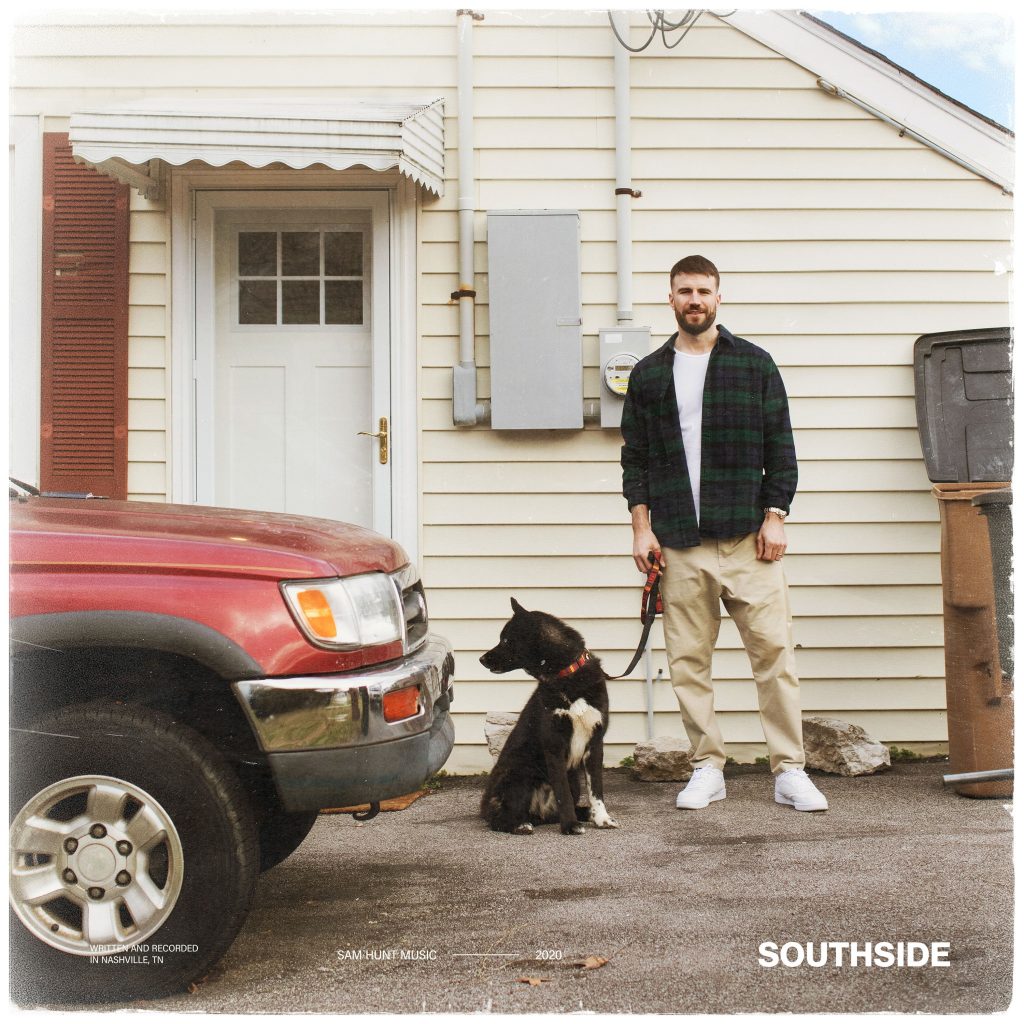Album Review: Sam Hunt’s ‘Southside’
Here's what we thought of 'Southside.'

Sam Hunt pulls back the curtain on the person underneath the artist on his new album, Southside. Hunt’s highly anticipated sophomore project stands as an exploration of his innermost thoughts wrapped around the hip-hop-meets-country production he’s famous for. It seems as though the superstar is processing a time of instability he experienced between his blockbuster debut Montevallo in 2014 and his second studio installment, exploring the dark days of his past through the art of song.
Hunt essentially released the album in fragments over the past six years, as it comes tailor made with the bona fide smash, “Body Like a Back Road,” follow up single “Downtown’s Dead” first hit of the new era, “Kinfolks,” and the personal confession that is “Drinkin’ Too Much” that dropped in 2017. Raw emotion begins peeking through, setting the tone for a project where introspection, heartache and celebration all thrive.

Hunt opens the album with the striking “2016,” drawing the listener in with his mystifying voice and storytelling capabilities. With just a piercing vocal and gentle instrumentation, including a subtle steel guitar that adds an air of nostalgia, Hunt explores all the decisions he wishes he could reverse such as keeping random girls’ numbers in his phone and nights he spent partying on Broadway, inspiring him to wash himself of regret and go back to the person he loves. The acoustic-driven melody feels fresh for the singer who introduced himself to the world with his Georgia boy swagger on early hits like “Take Your Time,” calling on the “three chords and the truth” mentality to tell his story. Hunt continues down this divergent path with “Hard to Forget,” a hip-hop infused bop about a woman he’s not over as much as he thought he was. His decision to sample Webb Pierce’s “There Stands the Glass” adds a unique touch that proves Hunt has a deeper knowledge and respect for classic country music than his critics may have accounted for. Pierce’s potent lyrics about drowning one’s sorrows in a tall glass of something strong while pondering about the person you can’t get off your mind is fitting alongside Hunt’s modern interpretation of seeing an ex everywhere he goes, exhibited through the clever hook “you’re playing hard to forget.”
He leans into his old tricks on “Kinfolks,” which feels like a continuation of his pre-Southside work more so than the new flavor he demonstrates with songs like “2016.” “Kinfolks” acts as part two of “Take Your Time” where instead of simply wanting to steal a few moments with the woman who has piqued his interest, he’s determined to get personal, eager to take her to the Georgia pines he grew up around and meet the family and community that raised him. The theme of young love takes center stage on “Young Once,” Hunt reminiscing about the cheap thrills of youth and appreciating the passion that comes with acting on one’s emotions in youthful innocence. Meanwhile, “Let it Down” is a certified banger with its enticing blend of hip-hop bass and a banjo lick that’s bound to be a fan favorite.
But Hunt takes a bold step with “That Ain’t Beautiful.” Though he takes a hard look at his own decision making in “2016,” he turns the table on his female counterpart, who cloaks herself in superficiality and destructive behavior like taking Adderall in the bathroom at a club with strangers to causing drama at a friend’s wedding because her date was checking out another woman on Instagram. Hunt holds a mirror up to her disreputable habits while encouraging her “that ain’t beautiful, no that ain’t you, you can do better,” he croons over a smooth, pulsing beat. Hunt continues to reveal layers of honesty on “Sinning With You,” a personal reflection on the repressive traditions he was raised on. The hit maker sings of his conflicting feelings finding purity and sanctuary in the arms of a lover and a relationship that would be deemed sin worthy, exploring this complicated dynamic through lyrics, “I know what it feels like, crossing the line, but I never felt shame, never felt sorry, never felt guilty touching your body.” He balances this with the amusing title “Breaking Up Was Easy in the 90’s” that has him detailing the millennial plight of watching your ex move on through social media – which especially stings when they’re moving on faster than you are.
But Hunt unites these pain-soaked vignettes in the autobiographical, “Drinkin’ Too Much.” The song acts as an open letter to his now-wife Hannah Fowler during an intense period of separation before they wed in 2017. The song unfolds as a series of unfiltered confessions as Hunt spends the first verse apologizing for robbing her of her privacy with his life in the limelight. Though Hunt takes responsibility for the emotional turmoil he put her through, he also explores how he was living in his own personal hell, whether performing live while under the influence or reflecting on their heart-wrenching breakup at a hotel in Phoenix. “Hannah Lee I’m on my way to you, nobody can love you like I do, I don’t know what Imma say to you, but I know there ain’t no way we’re through,” he begs, his vocal delivery and the production capturing the longing and emptiness he felt at the time. These mark the final words on the album before it ends with a string of cinematic piano notes that linger like the end credits of a movie.
Hunt has a specific way of balancing slick production with his words that paint broad brushstrokes on the introspective project. The modern trailblazer feels revitalized on Southside, moving the ticker forward enough to indicate that he has evolved while solidifying his ability to establish a distinct sound and lyrical prowess that continues to captivate the country audience.


